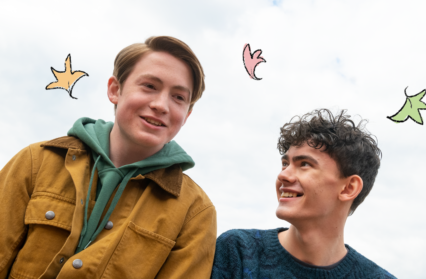Matt Taylor reviews Heartstopper, the Netflix coming-of-age romance gaining acclaim for its representation of queer relationships, written by Alice Oseman and directed by Euros Lyn.
Representation matters. Anyone who tells you differently is either kidding themselves or lying. It matters for so many people across the world: women, people of colour, disabled people, queer people, and so many more besides who never see themselves reflected in the media they enjoy. We’re given the tiniest crumbs from corporations who expect us to be grateful for a single line or person thrown our way. To them we’re worth nothing more than the money we put in their pockets. But we matter. Diversity and representation matter, and every once in a while, a sea-change happens. Something comes along so bold, brilliant, and unafraid that it shows us the power of telling new stories – of making change. Enter Alice Oseman’s Heartstopper.
Based on Oseman’s ongoing series of graphic novels of the same name, Heartstopper follows teenagers Charlie Spring (Joe Locke) and Nick Nelson (Kit Connor, who eagle-eyed viewers may recognise as a young Elton John in Rocketman) as they meet and begin to fall for each other. The pair’s blossoming romance puts pressure on their friendships, however, and tensions begin to rise as Charlie, Nick, and their pals wrestle with this newfound crush. If that sounds somewhat familiar, you wouldn’t technically be wrong – but you’d only be totally correct if the relationship at the show’s centre was a heterosexual one. That’s a dynamic we’ve seen a thousand times, and as recent coming-of-age fare such as Booksmart is beginning to prove, an added dash (or boatload) of queerness is a great way to give these tired tropes a twenty-first century twist. Though it’s immediately obvious where the narrative is headed (and props to the show for making no effort to hide this – we know what’s going to happen, the interesting thing is how we get there), Heartstopper’s innate queerness gives it a somewhat revolutionary edge.
But all of this would be for nothing if the show surrounding all this queerness was bad (never forget: the first gay superhero in a modern blockbuster was actually in 2017’s Power Rangers remake, but because no one saw that movie, no one remembers that fact). So, let’s be thankful that it is a truly stellar debut season of television. Adapting roughly the first two volumes of Oseman’s novels, these initial eight episodes form some of the best British entertainment of the last few years.
Oseman adapts her own work, writing all episodes and serving as executive producer. The dialogue positively sparkles with joy and flutters with that wondrous feeling of a newfound crush. It’s beautifully directed, too. Doctor Who veteran Euros Lyn helms the entire season, unashamedly embracing the comic book nature of the source material. From a purely visual standpoint, this is perhaps the most comic book-y adaptation of anything since Raimi’s Spider-Man twenty years ago. Not only that, but Oseman and Lyn’s combined writing and direction result in a perfectly paced season: each episode carries a simple one-word title that tells the audience everything they need to know (and, indeed, makes each episode feel like an issue of a comic series), and the progression of every relationship, be it romantic or platonic, feels incredibly natural, and the endpoint of every character’s arc feels more than earned.
One thing that’s important to remember about Heartstopper is that, as adults, we are not the target audience. This is a show about teenagers that’s aimed at those same teenagers. And what’s important for them right now is that they see themselves portrayed onscreen in a positive light. There will be teenagers across the country who start feeling the confidence to come out to their families and friends because of shows like this: not just gay teens, but bisexuals and trans kids, too. Heartstopper is the kind of television that benefits everyone – and, indeed, it’s something many of us in the queer community may wish we had available to us when we were teens. I know for a fact that I’d have felt much more comfortable in high school if I’d seen the beautiful exchange between one character and his mum, played to perfection by Olivia Colman, as he tells her he’s bisexual.
But what matters is that it’s available now, to the kids who need it. It’s an escape to an idealised world where queer teens are free to live as they are, to find love and happiness in both other people and themselves, and to realise that so much of the world has their back. Not only is Heartstopper an incredible piece of entertainment, but it’s perhaps one of the most important British shows of all time. Because representation matters. And anyone who tells you differently is either kidding themselves or lying.
Heartstopper is streaming on Netflix now.












